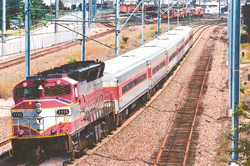
A transportation bond bill signed by Massachusetts Gov. Mitt Romney Aug. 10
includes the long-awaited New Bedford/Fall River commuter rail project – but
the state wants matching federal funds before making its financial commitment.
The transportation bond bill includes the extension of commuter rail service to Fall River and New Bedford, but the governor said the state “will not spend money on expansion projects where federal monies are not provided” because “the MBTA is not financially capable of funding these expansion projects,” Massachusetts Highway Department spokesman John Carlisle said.
The governor’s inclusion of the project in the transportation bond bill gives hope that the rail will become a reality, but the $800 million project is still “far from the goal line,” said Southeastern Regional Planning and Economic Development District CEO Steve Smith.
“I wouldn’t say it’s probable that the federal government will contribute 50 percent of the money, but we were looking into that possibility before. If $400 million can be obtained from the Feds, it will help the state tremendously,” Smith said. “It will make the process of getting this project done even longer, though. Asking for federal money triggers federal environmental reviews – which are no more stringent than the state’s – but it’s about a five-year process.”
The governor vetoed a section of the bill that would give first priority to projects that serve cities and towns without commuter rail or rapid transit services – including New Bedford and Fall River, reports Southcoast on Track, an alliance of public and private sector community leaders committed to getting commuter rail service between Boston and the South Coast.
“The governor doesn’t want to push back other projects that are further along to give priority to towns based on their not having a commuter rail,” Carlisle said. “There are significant issues that need to be addressed with the (New Bedford/Fall River) project before we can talk in terms of funding. You can’t build without the groundwork.”
The issues the governor refers to will be addressed.
Massachusetts Transportation Secretary Daniel A. Grabauskas announced Aug. 11 a $200,000 contract from the Massachusetts Bay Transportation Authority to restart the project study commission that was suspended in 2002 to study issues with the project.
The Fall River/New Bedford Commuter Rail Growth Management Task Force – part of the southeastern economic development district – will research the regional impact of a commuter rail line by evaluating the negative impacts a rail system would have on the region – such as urban sprawl, noise and environmental impacts – and the positive impacts, Smith said.
Some benefits to be studied by the task force are possible property value increases, job growth and business investments to the areas surrounding the stations, and traffic alleviation.
The MBTA is also close to overcoming another hurdle in the project by negotiating a deal with CSX Corp. to possibly purchase 33 miles of track needed for the project, Smith said. The MBTA cannot allocate money to upgrade the rail tracks until CSX agrees, Smith said.
The project will extend the existing Stoughton Line service from South Station and Back Bay Station to New Bedford and Fall River, including new construction of track, bridges, grade crossings, intersection improvements, and eight new commuter rail stations as well as two train layover facilities, the MBTA reports.
It is supposed to provide 16 daily round trips – eight round trips to New Bedford and eight to Fall River – and serve about 4,280 new daily inbound riders, MBTA reports.












